
Science, Engineering, Health and Education Group
The Science, Engineering, Health and Education Group at Manchester Metropolitan University comprises 120 technicians who support 3 academic faculties:
- Science and Engineering;
- Health, Psychology and Social Care (HPSC);
- Education.
Technicians at Manchester Metropolitan University
At the university technicians work in collaboration with academic colleagues to:
- Design and deliver practical skills training;
- Conduct research;
- Design, manage and operate specialist teaching and research spaces;
- Manage and operate specialist equipment (including commercial activity);
- Design and run outreach, widening participation and extra-curricular activity.
Group Key Achievements
This article summarises the group’s key achievements during the 18/19 academic year. These achievements all drive to increase faculty performance in TEF, REF and NSS and are in addition to supporting BAU (business as usual). They also support the university in demonstrating progress against the four pillars of the Science Council’s Technician Commitment initiative: Visibility, Recognition, Career Development and Sustainability.
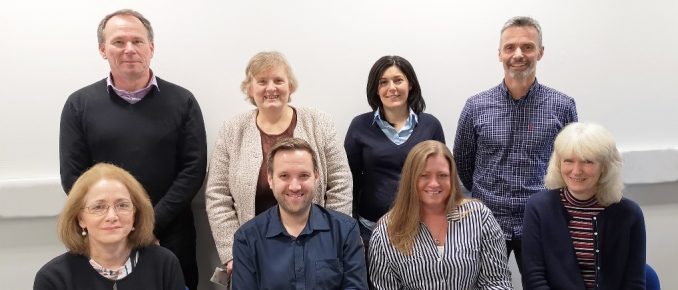 Science, Engineering, Health and Education Group senior leaders: (left-right, back) Steve Moyle, Jane Barlow, Tiziana Denaro, Garry Pheasey; (left-right, front) Morvarid Randjbar, Ian Tidmarsh, Helen Bentley and Sue Hutchinson
Science, Engineering, Health and Education Group senior leaders: (left-right, back) Steve Moyle, Jane Barlow, Tiziana Denaro, Garry Pheasey; (left-right, front) Morvarid Randjbar, Ian Tidmarsh, Helen Bentley and Sue Hutchinson
Faculty of Science and Engineering
Scientific Equipment Sustainability: In a STEM environment, scientific equipment underpins teaching and research activity. Following significant growth in research activity the faculty required a mechanism to recover equipment related costs from external funders. The ‘Faculty Core Facilities’ model was developed and implemented by TS (Technical Services) to improve equipment strategy, management and sustainability. The model indicated that if all equipment was fully utilised for research, external cost recovery could be £2.5m per annum. TS also reviewed specialist equipment support resulting in a realignment of staff resource to better support faculty priorities.
Developing Infrastructure: The faculty is undertaking an ambitious capital build programme with a total budget of £145m. The John Dalton New Build (£118m; the highest value single project ever undertaken at MMU) will deliver enhanced teaching and research spaces. This will include an interdisciplinary ‘Super’ teaching laboratory delivering a modernised STEM curriculum and Research Centre space to accommodate the faculty’s impressive growth in RKE activity. New accommodation for the Department of Sport and Exercise Sciences (£27m; on a prominent location on Oxford Road) will deliver further new teaching and research space enabling a significant growth of both student numbers and RKE activity. TS have used their knowledge of specialist space and equipment requirements to develop the plans in collaboration with academic colleagues and design teams. Both projects successfully passed RIBA stage 3.
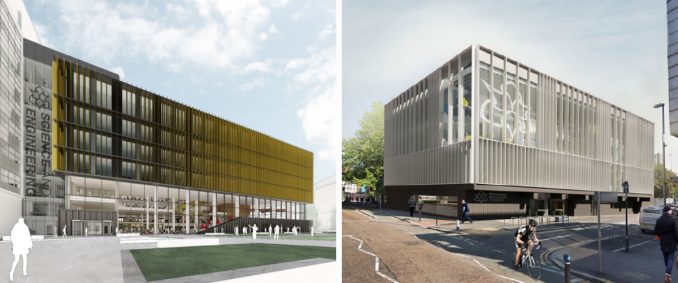
Developing Infrastructure: John Dalton New Build (left) and the Department of Sport and Exercise Sciences Building (right) architect illustrations
Cheshire Transition: The transfer of staff and scientific equipment from the Cheshire to the All Saints campus was challenging given the complexity of activity, the logistics and the emotion resulting from campus closure. 25 members of staff required relocation and over 1,000 individual items of scientific equipment required movement and recommissioning. A full review of activity, space requirements and assets was completed across both sites. This resulted in staff moving to academically aligned locations, equipment rationalisation, and increased space utilisation. An understanding of the personal aspects of the transition ensured a supportive and sympathetic approach. The transfer completed on time and on budget.
Ordering Efficiency: An intermediary ordering system was in use across the faculty causing duplication of effort and increased timescales. Simultaneously, a significant growth in research activity increased order generation particularly for laboratory consumables. To reduce the number of individual orders and improve the availability of consumables, TS increased access and stock holdings within the Faculty Store. To provide staff resource, the intermediary system was withdrawn following staff and student P2P training. In addition to service enhancement, 3 FTE was released and reinvested to increase student-facing activity.
Realigned Specialist Computing Support: During 2018 BAU IT activity transferred from TS Specialist Computing to ISDS. Following a reorganisation (resulting in release of 1 FTE) 2 new teams were formed aligned to faculty teaching & RKE priorities. For teaching, in-class specialist support is now provided; team-produced TEL content enables equipment use; and technician-lead surgeries upskill students and staff. For research, specialist computing assets such as the Linux platform (critical for Big Data research) are continually developed and maintained. In addition, 2 new software solutions were deployed across the faculty: LabCup (a risk and asset management system); and Connect 2 (equipment loan package). With the arrival of SODA demand for the team’s skills will increase given expertise in key areas e.g. animation, AR, VR, gaming and UX (usability).
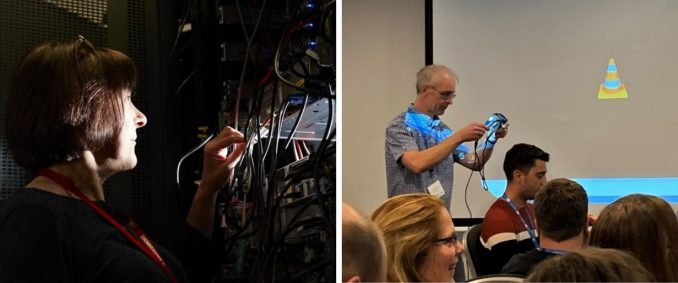
Realigned Specialist Computing Support: Linux support (left) and usability training (right)
Increasing Student Employability: The employers of engineering students seek graduates who have expanded their studies through extra-curricular activity: “We look for graduates who have done that little bit extra”. Students have the opportunity to join an enquiry-based learning project in which they design, build and competitively race a car, motorbike, train or plane – Mcr Met Racing. One employer states they only employ graduates who have been part of the project. A new Makers space has been created expanding the facilities open to students undertaking extra-curricular activity. The space has enabling greater technician-student interaction increasing the skills and knowledge TS can transfer to students.
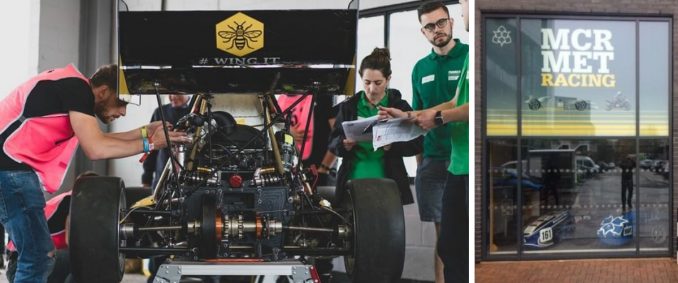
Increasing Student Employability: The student team (left) and new Makers space (right)
Enhanced Research Support – Fuel Cell Innovation Centre: During the 18/19 session, the Fuel Cell Innovation Centre grew rapidly in terms of RKE activity and equipment portfolio. The new role of ‘Technical Services Facilities Manager’ was established to extend the specialist technician career pathway and to provide high level specialist technical support to the Centre. Appointment resulted in the development and implementation of laboratory and equipment management systems and increased H&S support. Typically considered a high-risk area, robust H&S management resulted in a very positive external safety inspection. In addition, staff and student training has been enhanced to ensure high quality research output and increased asset utilisation.
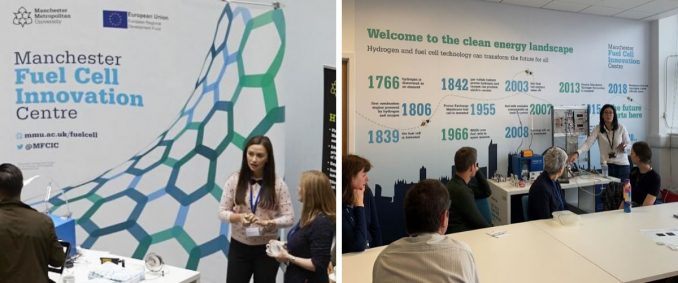
Enhanced Research Support: External engagement (left) and Equipment demonstrations (right)
Faculties of HPSC and Education
Enhanced Cross-Faculty Support in Brooks: The Brooks Building provides primary accommodation for both the Faculties of HPSC and Education. A full review of TS staffing was undertaken in Brooks to ensure faculty-aligned and efficient service delivery. It was identified that work was primarily of two levels: common support (e.g. setting up specialist spaces) and specialist support (delivering a technical specialism). The reorganisation of 4 teams resulted in release of 2 FTE to enable creation of the Brooks ‘Resource Centre’ team. The new team is student facing and operates as a ‘single point of contact’ for all student and staff TS requests. This team operates across both faculties to provide common support; this is cost effective and ensures that specialist technicians can focus on training students and staff.

Enhanced Cross-Faculty Support: Brooks Resource Centre
